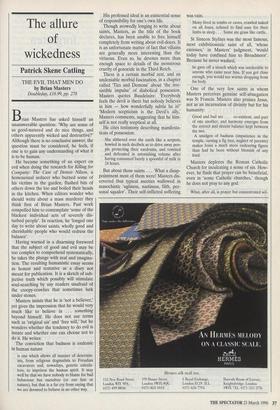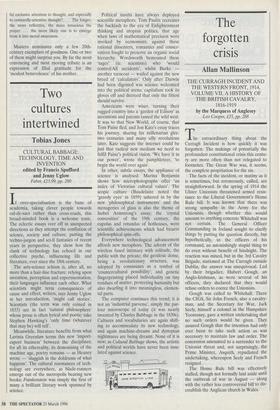The allure of wickedness
Patrick Skene Catling
THE EVIL THAT MEN DO by Brian Masters Doubleday, £16.99, pp. 278 Brian Masters has asked himself an unanswerable question: 'Why are some of us good-natured and do nice things, and others apparently wicked and destructive?' Although there is no conclusive answer, the question must be considered, he feels, if one is to gain any understanding of what it is to be human.
He became something of an expert on evil when doing the research for Killing for Company: The Case of Dennis Nilson, a homosexual seducer who burned some of his victims in the garden, flushed bits of others down the loo and boiled their heads in the kitchen. When editors wonder who should write about a mass murderer they think first of Brian Masters. Past work compelled him to contemplate 'some of the blackest individual acts of severely dis- turbed people'. In reaction, he 'longed one day to write about saints, wholly good and cherishable people who would redress the balance'.
Having warned in a disarming foreword that the subject of good and evil may be too complex to comprehend systematically, he takes the plunge with zeal and imagina- tion. The resulting humanistic essay seems as honest and tentative as a diary not meant for publication. It is a sketch of sub- jective truth which possibly will stimulate soul-searching by any readers unafraid of the creepy-crawlies that sometimes lurk under stones.
Masters insists that he is 'not a believer,' yet gives the impression that he would very much like to believe in . . . something beyond himself. He does not use terms such as 'original sin' and 'free will,' but he wonders whether the tendency to do evil is innate and whether one can choose not to do it. He writes: The conviction that badness is endemic in human nature
is one which allows all manner of determin- ists, from religious dogmatists to Freudian excavators and, nowadays, genetic calcula- tors, to imprison the human spirit. It may well be that we have nobody to blame for bad behaviour but ourselves (or our fate or nature), but that is a far cry from saying that we are doomed to behave in no other way.
His professed ideal is an existential sense of responsibility for one's own life.
Though avowedly longing to write about saints, Masters, as the title of the book declares, has been unable to free himself completely from writing about evil-doers. It is an unfortunate matter of fact that villains are generally more interesting than the virtuous. Even so, he devotes more than enough space to details of the monstrous cruelty of genocide in the Third Reich.
There is a certain morbid zest, and an undeniable morbid fascination, in a chapter called 'Tics and Demons' about 'the irre- sistible impulse' of diabolical possession. Masters quotes Baudelaire: 'Everybody feels the devil is there but nobody believes in him — how wonderfully subtle he is!' `Modern scepticism is the Devil's ally,' Masters comments, suggesting that he him- self is not really sceptical at all.
He cites testimony describing manifesta- tions of possession:
She slithered over the earth like a serpent, howled in such decibels as to drive away peo- ple protecting their eardrums, and vomited and defecated in astonishing volume after having consumed barely a spoonful of milk in 24 hours.
But about those saints . . . What a disap- pointment most of them were! Masters dis- covered that typical ascetics wallowed in masochistic 'ugliness, nastiness, filth, per- sonal squalor'. Their self-inflicted suffering was vain.
Many lived in tombs or caves, crawled naked on all fours, refused to find ease for their limbs in sleep . . . Some ate grass like cattle.
St Simeon Stylites was the most famous, most exhibitionistic saint of all, 'whose excesses,' in Masters' judgment, 'would today have confined him to Broadmoor'. Because he never washed,
he gave off a stench which was intolerable to anyone who came near him. If you got close enough, you would see worms dropping from his body.
One of the very few saints in whom Masters perceives genuine self-abnegation was St Francis. Masters also praises Jesus, not as an incarnation of divinity but for his humanity:
Good and bad are . . . co-existent, and part of one another, and harmony emerges from the correct and decent balance kept between the two.
A smidgen of badness (impatience in the temple, cursing a fig tree, neglect of parents) makes Jesus a much more endearing figure than had he been without blemish of any kind.
Masters deplores the Roman Catholic Church for inculcating a sense of sin. How- ever, he finds that prayer can be beneficial, even in 'some Catholic churches,' though he does not pray to any god.
What, after all, is prayer but concentrated wil- ful exclusive attention to thought, and especially to outwardly-attentive thought?... The longer, the more reflective, the more tenacious the prayer . .. the more likely one is to emerge from it into moral awareness.
Masters nominates only a few 20th- century exemplars of goodness. One or two of them might surprise you. By far the most. convincing and most moving tribute is an expression of filial gratitude for the `modest benevolence' of his mother.



































































 Previous page
Previous page